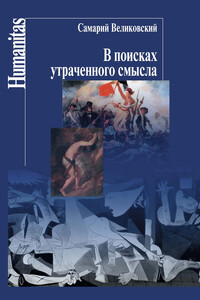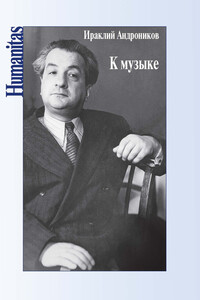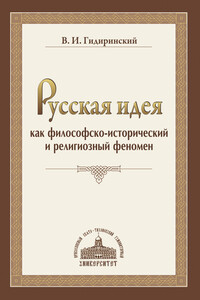Энактивизм: новая форма конструктивизма в эпистемологии - страница 171
154. De Jaegler H., Di Paolo E. Parpicitatory Sense-making. An Enactive Approach to Social Cognition // Phenomenology and Cognitive Sciences. 2007. Vol. 6. P. 485–507.
155. Depraz N. When Transcendental Genesis Encounters the Naturalization Project // Naturalizing Phenomenology. Issues in Contemporary Phenomenology and Cognitive Science. Stanford: Stanford univ. press, 1997. P. 464–483.
156. Depraz N, Varela F. J., Vermersch P. On Becoming Aware. A Pragmatics of Experiencing. Amsterdam etc.: John Benjamins Publishing Company, 2003.
157. Die erfundene Wrklichkeit. Wie wissen wir, was wir zu wissen glauben? / Hrsg. von Paul Watzlawick. München: Piper, 1998. 10. Aufage.
158. Di Paolo E. Extended Life // Topoi. 2009. Vol. 28. P. 9–21.
159. Dormir, Rêver, Mourir. Explorer la conscience avec le Dalaï-Lama. Sous la direction de Francisco Varela. P.: NiL éditions, 1998.
160. Dupuy J.-P. Philosophy and Cognition // Naturalizing Phenomenology. Issues in Contemporary Phenomenology and Cognitive Science. Stanford: Stanford University Press, 1997. P. 539–558.
161. The Dynamical Systems Approach to Cognition. Concepts and Empirical Paradigms Based on Self-organization, Embodiment, and Coordination Dynamics. Singapore: World Scientifc Publishing Co., 2003.
162. Entre le corps et l’esprit. Approache interdisciplinaire du Mind Body Problem / Eds. Feltz B., Lambert D. Liège: Pierre Mardaga éditeur, 1994.
163. Erdi P. Complexity Explained. B.: Springer, 2008.
164. Fadiman J. The Psychedelic Explorer’s Guide: Safe, Therapeutic, and Sacred Journeys. Rochester, Vt.: Park Street Press, 2011.
165. Favareau D. Essential Readings in Biosemiotics: Anthology and Commentary. Heidelberg, etc.: Springer, 2010.
166. Foerster H. von. Das Konstruieren einer Wirklichkeit // Die erfundene Wrklichkeit. Wie wissen wir, was wir zu wissen glauben? München: Piper, 1998.
167. Foerster von H., Pörksen B. Wahrheit ist die Erfndung eines Lügners: Gespräche für Skeptiker. 2. Auf. Heidelberg: Carl-Auer-Systeme Verlag, 1998.
168. Fuchs T., Jaegher de H. Enactive Intersubjectivity: Participatory Sense-making and Mutual Incorporation // Phenomenology and Cognitive Sciences. 2009. Vol. 8, N 4. P. 466.
169. Gallagher S., Zahavi D. The Phenomenological Mind. An Introduction to Philosophy of Mind and Cognitive Science. L., N.Y.: Routledge, 2008.
170. Gardellini L. The Foundations of Radical Constructivism: An Interview with Ernst von Glasersfeld // Foundations of Chemistry. 2006. Vol. 8. P. 177–187.
171. Gelder T. van. What Might Gognition Be, If Not Computation? // The Journal of Philosophy. 1995. Vol. 92. N 7. P. 345–381.
172. Gelder T. van., Port R. F. It’s About Time: An Overview of the Dynamical Approach to Cognition // Mind as Motion. Exploration in the Dynamics of Cognition / Ed. R. F. Port and T. van Gelder. Cambridge: MIT Press, 1995.
173. Gide A. Journal. 1889–1939. P.: Gallimard, 1951.
174. Glasersfeld E. von. Radical Constructivism: A Way of Knowing and Learning. L.: Farmer Press, 1985.
175. Godfrey-Smith P. Complexity and the Function of Mind in Nature. Cambridge: Cambridge University Press, 1996.
176. Hegel G.W.F. Philosophie des Geistes. Sämtliche Werke in 20 Bänden. 10. Band. Stuttgart: Frommanns Verlag, 1929.
177. Heinz von Foerster im Gespräch mit Albert Müller und Karl H.Müller. Rück-und Vorschauen // Konstruktivismus und Kognitionswissenschaft. Kulturelle Wurzeln und Ergebnisse / Hrsg. von Müller A.; Müller K.L. und Stadler F. Wien: Springer, 1997. S. 224–225.
178. Holland J. H. Hidden Order: How Adaptation Builds Complexity. Readings (MA): Addison-Wesley Publishing Company, 1995.
179. Horgan J. The End of Science. Facing the Limits of Knowledge in Twilight of the Scientifc Age. N.Y.: Broadway Book, 1997.
180. Horgan T., Tienson J. A Nonclassical Framework for Cognitive Science // Synthese. 1994. Vol. 101. N 3. P. 305–345.
181. Husserl E. Zur Phänomelogie des inneren Zeitbewusstseins. Gesammelte Werke. Bd. 10. Haag: Martinus Nijhoff, 1966.







